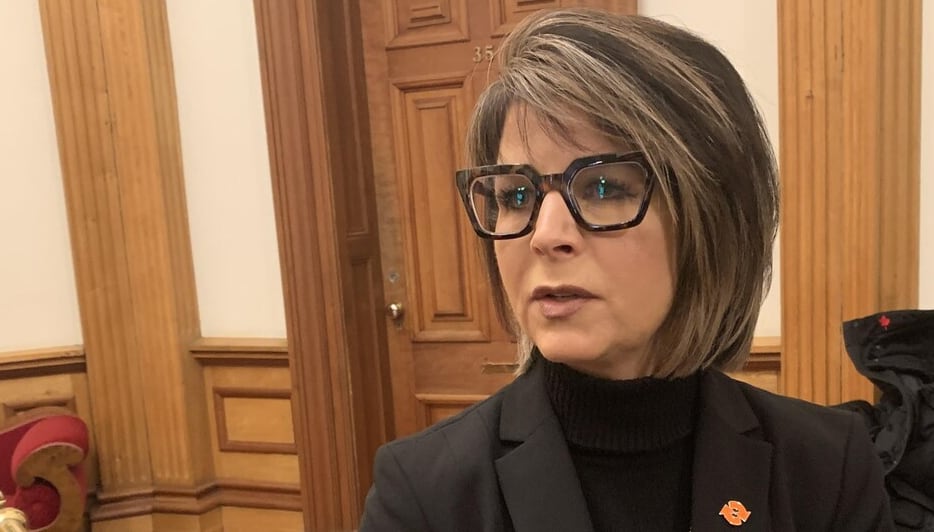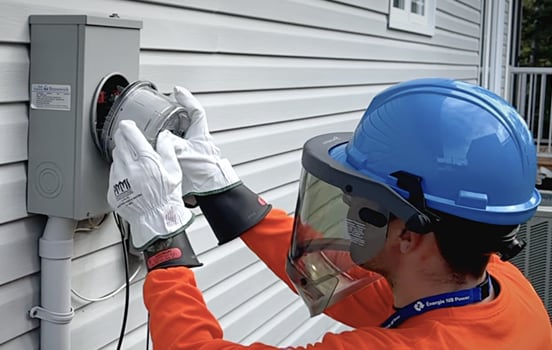The number of New Brunswick households refusing the installation of an N.B. Power smart meter has ballooned to an estimated 17,000 — 10 times the rejection rate the utility told MLAs it was experiencing just last year
But N.B. Power says this is not the reason it is reworking how it will deal with those who opt out of the smart meter program, including tripling costs these customers will have to pay for hanging onto their old meters.
“NB Power is not penalizing customers,” the utility wrote in an emailed statement to CBC News about changes, including pricing changes, it is proposing to its opting-out plan.
N.B. Power is in the final stages of installing up to 388,000 new “communicating” smart meters across the province as part of a multi-year effort to upgrade its electrical distribution grid.
The changes will allow the utility to collect individual customer consumption data electronically in real time instead of once a month by a meter reader.
Smart meters can be in constant communication with the power utility. That allows for instant identification and precise location of outages and lets customers track their own daily electrical consumption so they can make changes to head off large monthly bills if they choose.
N.B. Power is asking the Energy and Utilities Board for permission to charge higher fees to customers who don’t have a smart meter.
In addition the meters will eventually allow for pricing and service innovations such as offering different electricity prices at different times of the day to match periods of low and high demand.
But the devices are not without controversy.
Online opponents allege a number of disputed health and safety threats posed by the meters. Some also question the meters’ accuracy and still others object to their constant farming of electrical consumption data as a privacy invasion.
Moncton’s Clarence Maillet is one of the thousands who have told N.B. Power not to install a smart meter on his home.
Maillet is wary of the technology, and he is unhappy to learn N.B. Power is suggesting people like him pay a special charge starting next spring to keep his current meter.
“I don’t agree with them charging at all for the reading of the meter,” Maillet said.
“I mean, it’s five bucks here, 10 bucks there.”

In documents filed with the New Brunswick Energy and Utilities Board as part of its next rate hearing N.B. Power is proposing to manually read meters that have not been upgraded six times a year for customers who refuse a new device.
To pay that expense, it wants to charge those who opt out a special meter-reading levy of $4.65 a month beginning next April.
“The standard meter at N.B. Power is now a smart meter,” the utility states in its application..
“Customers who choose a non-standard meter option will require the meter to be read manually. In fairness to all customers, the cost to manually read meters should be recovered from those that have made the choice to opt-out of the standard service.”

N.B. Power’s new opt-out plan is different from what the utility originally outlined during hearings that approved the installation of smart meters in 2020.
At the time, N.B. Power told the Energy and Utilities Board it would be manually reading the meters of those who refused smart devices just twice per year “in order to keep that cost low”
That is similar to Quebec, where those without smart meters often have their old meter read once a year. However, Hydro-Quebec also allows those customers to read their own meters and submit the results monthly. The single annual meter reading done by the utility validates those numbers.
In New Brunswick, two meter readings per year would carry a charge of $1.55 per month according to the utility’s own figures but in an email N.B. Power spokesperson Elizabeth Fraser said the utility has come to believe six meter readings per year “offers a better service” to customers.
She said more frequent readings would produce better consumption estimates in off months, and the billing adjustments would be less dramatic when those estimates are inaccurate.
That will make for a “more positive customer experience” than N.B. Power’s original plan according to Fraser, even if it does cost more.
The utility insists that financially penalizing those who refuse a smart meter by raising the cost of opting-out with more frequent meter readings played no role in the change.
“Boosting the actual reads on an annual basis will improve service to customers,” wrote Fraser.
However, the change in the opting-out plan comes as N.B. Power copes with much heavier resistance to smart meters than it was expecting.

In February 2024 N.B. Power President Lori Clark told MLAs that fewer than 200 customers had declined a meter during the first 40,000 installations.
“We’ve seen a 0.45 per cent opt out rate,” said Clark. “Most people don’t care about a meter change on the side of their house.”
But that rate soared as installations continued.
N.B. Power’s Phil Landry is supervising the smart meter program and said earlier this month the utility was at 17,000 refusals, with about 50,000 installations still to go.
That is a rejection rate several times higher than MLAs heard about, but Landry says the utility believes opposition will wane as people get used to the technology and more effort is made to persuade those who have said no to change their minds.
“Once all the meters are installed we go back and do a campaign with those who opted out just to provide more information to ensure all of their questions are answered,” Landry said.






